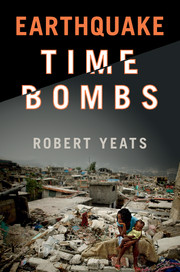Book contents
- Frontmatter
- Contents
- Acknowledgments
- Why this book?
- PART I EARTHQUAKES, DEEP TIME, AND THE POPULATION EXPLOSION
- PART II EARTHQUAKE TIME BOMBS
- TIME BOMBS WHERE THE PROBLEM IS UNDERSTOOD, BUT THE RESPONSE IS STILL INADEQUATE
- OTHER TIME BOMBS, INCLUDING CITIES THAT ARE NOT WELL PREPARED
- 13 Age of Enlightenment and the 1755 Lisbon earthquake
- 14 Jerusalem: earthquakes in the Holy Land
- 15 Istanbul: responding to an official earthquake warning
- 16 Tehran: the next earthquake in the Islamic Republic of Iran?
- 17 Kabul: decades of war and Babur's warning
- 18 Earthquakes in the Himalaya
- 19 Myanmar and the Sagaing fault
- 20 Metro Manila, the Philippines
- 21 Lima, Peru: Inca earthquake-resistant construction and a bogus American earthquake prediction
- 22 Andean earthquakes in Quito and Guayaquil, Ecuador
- 23 Caracas: lots of oil, but little interest in earthquakes
- 24 Haiti, which lost its gamble, and Jamaica and Cuba (not yet)
- 25 Mexico City: bowl of jello inherited from the Aztecs
- 26 Central America and the earthquake that brought down a dictator
- 27 East African Rift Valley: a tale of two cities
- PART III SUMMARY AND RECOMMENDATIONS
- References
- Index
17 - Kabul: decades of war and Babur's warning
from OTHER TIME BOMBS, INCLUDING CITIES THAT ARE NOT WELL PREPARED
Published online by Cambridge University Press: 05 November 2015
- Frontmatter
- Contents
- Acknowledgments
- Why this book?
- PART I EARTHQUAKES, DEEP TIME, AND THE POPULATION EXPLOSION
- PART II EARTHQUAKE TIME BOMBS
- TIME BOMBS WHERE THE PROBLEM IS UNDERSTOOD, BUT THE RESPONSE IS STILL INADEQUATE
- OTHER TIME BOMBS, INCLUDING CITIES THAT ARE NOT WELL PREPARED
- 13 Age of Enlightenment and the 1755 Lisbon earthquake
- 14 Jerusalem: earthquakes in the Holy Land
- 15 Istanbul: responding to an official earthquake warning
- 16 Tehran: the next earthquake in the Islamic Republic of Iran?
- 17 Kabul: decades of war and Babur's warning
- 18 Earthquakes in the Himalaya
- 19 Myanmar and the Sagaing fault
- 20 Metro Manila, the Philippines
- 21 Lima, Peru: Inca earthquake-resistant construction and a bogus American earthquake prediction
- 22 Andean earthquakes in Quito and Guayaquil, Ecuador
- 23 Caracas: lots of oil, but little interest in earthquakes
- 24 Haiti, which lost its gamble, and Jamaica and Cuba (not yet)
- 25 Mexico City: bowl of jello inherited from the Aztecs
- 26 Central America and the earthquake that brought down a dictator
- 27 East African Rift Valley: a tale of two cities
- PART III SUMMARY AND RECOMMENDATIONS
- References
- Index
Summary
THE NAHRIN EARTHQUAKE
We headed north from Kabul on a warm day in July 2002, on our way to Baghlan Province and the town of Nahrin, which had been devastated by a moderate-magnitude earthquake four months earlier. In the SUV belonging to Shelter for Life International were Chris Madden and I from Earth Consultants International and Harry van Burik and Lee Molini from Shelter for Life. We were there to investigate the earthquake, working with Shelter for Life, an NGO (non-governmental organization) that had been funded by the US Agency for International Development (USAID) to help Nahrin rebuild.
At first, the countryside looked very much like Pakistan, where I had been working on earthquake projects for nearly 25 years. But there was a difference. We passed the hulks of burnt-out tanks, and our driver pointed to little painted stones along the side of the road, marking the location of land mines. Don't go there.
The previous October, nine months earlier, Afghanistan had been attacked by its most recent invader, the United States, operating as part of NATO. In September 1996, five and a half years before, Taliban insurgents had captured Kabul and installed a rigid form of Islam, closing girls’ schools, holding public executions in the stadium, and hanging the previous pro-Communist leader, President Najibullah. The Taliban had provided a base for Osama bin Laden to plan the al-Qaida attacks of September 11, 2001, against the United States. The Taliban refused to turn over bin Laden and other al-Qaida operatives to the United States, and a month later the Americans launched their offensive.
The Taliban had never completely conquered Afghanistan. The northern part of the country is dominated by minorities, principally Tajiks and Uzbeks, who speak different dialects and follow a different brand of Islam than does the Taliban, dominated by the Pashtuns. They formed the Northern Alliance, a loosely organized group of militants who kept the Taliban at bay until 2000, when a Taliban offensive captured the city of Nahrin and drove its inhabitants into the Hindu Kush Mountains to the east. The American invasion was coordinated with the Northern Alliance and made taking over the country, including the area around Nahrin, much easier than it would have been otherwise.
- Type
- Chapter
- Information
- Earthquake Time Bombs , pp. 209 - 217Publisher: Cambridge University PressPrint publication year: 2015



